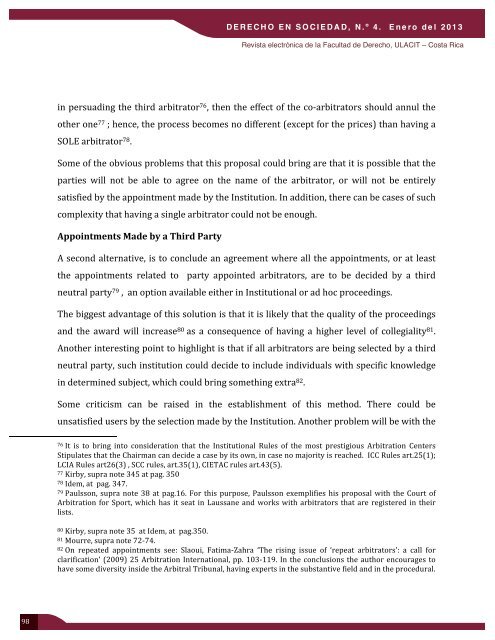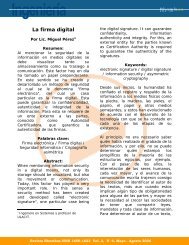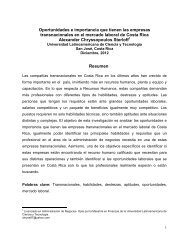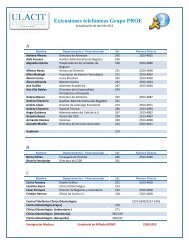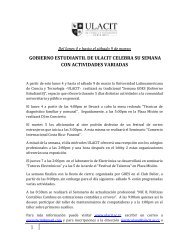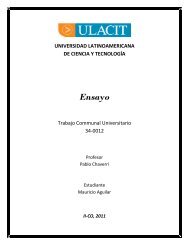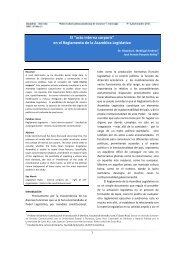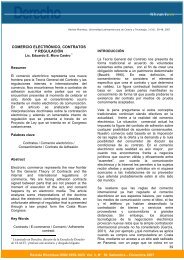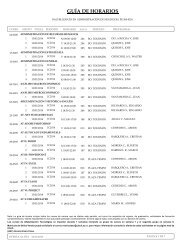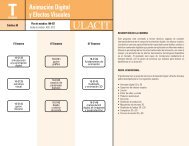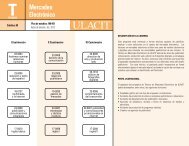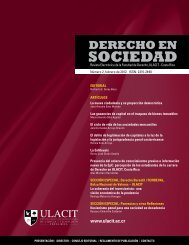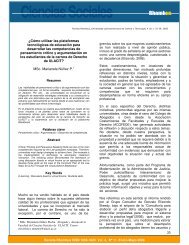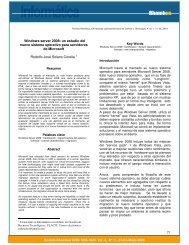IV Edición Revista Derecho en Sociedad - Ulacit
IV Edición Revista Derecho en Sociedad - Ulacit
IV Edición Revista Derecho en Sociedad - Ulacit
You also want an ePaper? Increase the reach of your titles
YUMPU automatically turns print PDFs into web optimized ePapers that Google loves.
DERECHO EN SOCIEDAD, N. º 4 . Enero del 2013<br />
<strong>Revista</strong> electrónica de la Facultad de <strong>Derecho</strong>, ULACIT – Costa Rica<br />
in persuading the third arbitrator 76 , th<strong>en</strong> the effect of the co-‐arbitrators should annul the <br />
other one 77 ; h<strong>en</strong>ce, the process becomes no differ<strong>en</strong>t (except for the prices) than having a <br />
SOLE arbitrator 78 . <br />
Some of the obvious problems that this proposal could bring are that it is possible that the <br />
parties will not be able to agree on the name of the arbitrator, or will not be <strong>en</strong>tirely <br />
satisfied by the appointm<strong>en</strong>t made by the Institution. In addition, there can be cases of such <br />
complexity that having a single arbitrator could not be <strong>en</strong>ough. <br />
Appointm<strong>en</strong>ts Made by a Third Party <br />
A second alternative, is to conclude an agreem<strong>en</strong>t where all the appointm<strong>en</strong>ts, or at least <br />
the appointm<strong>en</strong>ts related to party appointed arbitrators, are to be decided by a third <br />
neutral party 79 , an option available either in Institutional or ad hoc proceedings. <br />
The biggest advantage of this solution is that it is likely that the quality of the proceedings <br />
and the award will increase 80 as a consequ<strong>en</strong>ce of having a higher level of collegiality 81 . <br />
Another interesting point to highlight is that if all arbitrators are being selected by a third <br />
neutral party, such institution could decide to include individuals with specific knowledge <br />
in determined subject, which could bring something extra 82 . <br />
Some criticism can be raised in the establishm<strong>en</strong>t of this method. There could be <br />
unsatisfied users by the selection made by the Institution. Another problem will be with the <br />
76 It is to bring into consideration that the Institutional Rules of the most prestigious Arbitration C<strong>en</strong>ters <br />
Stipulates that the Chairman can decide a case by its own, in case no majority is reached. ICC Rules art.25(1); <br />
LCIA Rules art26(3) , SCC rules, art.35(1), CIETAC rules art.43(5). <br />
77 Kirby, supra note 345 at pag. 350 <br />
78 Idem, at pag. 347. <br />
79 Paulsson, supra note 38 at pag.16. For this purpose, Paulsson exemplifies his proposal with the Court of <br />
Arbitration for Sport, which has it seat in Laussane and works with arbitrators that are registered in their <br />
lists. <br />
80 Kirby, supra note 35 at Idem, at pag.350. <br />
81 Mourre, supra note 72-‐74. <br />
82 On repeated appointm<strong>en</strong>ts see: Slaoui, Fatima-‐Zahra ‘The rising issue of ‘repeat arbitrators’: a call for <br />
clarification’ (2009) 25 Arbitration International, pp. 103-‐119. In the conclusions the author <strong>en</strong>courages to <br />
have some diversity inside the Arbitral Tribunal, having experts in the substantive field and in the procedural. <br />
98


